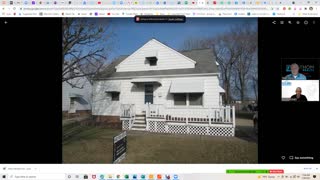Premium Only Content

Buying a NYC Co-op as an Investment Property: Great Idea or Nightmare?
Is buying a co-op in NYC as an investment property a good idea? Full blog post: https://www.hauseit.com/buying-nyc-co-op-investment-property-good-idea/
Reduce Your Buyer Closing Costs in NYC: https://www.hauseit.com/hauseit-buyer-closing-credit-nyc/
Save 6% When Selling in NYC: https://www.hauseit.com/agent-assisted-fsbo/
Visit https://hauseit.com to learn how to save money if you’re buying or selling a co-op, condo or townhouse here in NYC. So let’s get started!
Most buyers in New York City are attracted to co-ops because they’re less expensive than condos. The main reason why co-ops are cheaper is because there’s a much greater supply of them compared to condos, here in New York City. A co-op can be anywhere from 10% to 40% less expensive compared to an identical condo.
So shouldn’t you and every NYC real estate investor buy a co-op instead of a condo in order to generate a higher rental yield?
Well, the problem is that most co-ops in NYC are required to be used as primary residences. As a result, a typical co-op building has a limitation on the amount of subletting which is permitted.
A co-op may only permit subletting for 2 or 3 years out of every 5 years, and there could even be an initial owner-occupancy requirement before subletting is permitted. Stricter co-op buildings have a lifetime cap on the number of years of subletting during the course of ownership.
This is because subletting restrictions are obviously a deal breaker for an investor, who naturally is looking to rent out the apartment indefinitely in order to generate long-term cash flow.
However, there are a handful of co-op buildings in NYC which permit unlimited subletting. Therefore, some NYC real estate investors do end up considering and buying a co-op as an investment property. But is this a good idea?
In our opinion, buying a co-op as an investment property is not a good idea, even if the specific co-op building you’re considering permits unlimited submitting.
Here’s why: just because a co-op allows subletting today, doesn’t mean it will allow it in the future. The building could always vote to change the policy. This risk is particularly pronounced in a small co-op building, because all it could take is one or two resales in the building to flip the co-op’s culture and voting majority into opposing subletting.
Another major problem with owning a co-op as an investment property is the issue of board approval each time you have a new tenant. While both condos and co-ops in NYC usually have an extensive rental application and pretty high fees, co-ops are also allowed to reject an applicant without any consequences to the building.
If you irritate the board president or a board member, you could literally be dragged through the mud as these people engage in petty retaliation against you by rejecting your rental applicant, or perhaps multiple applicants. The co-op board could also take ages to review the application, thereby prolonging any vacancy period between tenants and costing you real money.
Condos, on the other hand, may not reject a rental applicant unless the building is willing to rent the unit from the owner on the same terms negotiated with the tenant. This is called the ‘right of first refusal’. In NYC, the likelihood of a condo exercising its right of first refusal is effectively zero, and it would only happen under extraordinary circumstances.
Moreover, condo boards are usually required to respond to a renter’s application within a set period of time, typically between 20 and 30 days. If the board doesn’t respond within this timeframe, the rental application is automatically approved. There is no such safety mechanism for co-op buildings.
We do want to emphasize that there are many real estate investors in NYC who own co-ops without any issue. It’s absolutely possible to own a co-op as an investment property in NYC, and be allowed to sublet immediately from day one, without any limitation.
The point of this video is to alert you of all risks of buying a co-op apartment as an investment property, and we’ve therefore focused on rather remote downside scenarios.
In conclusion, we personally don’t recommend buying a co-op as an investment property due to the additional risks involved compared to condo ownership.
If we look at the big picture, the rental yields are still similar for condos and co-ops despite the pricing disparity. It’s just not worth the extra risk or hassle to own a co-op just to receive a slight bump in the rental yield.
If you want a significantly higher investment yield, the truth is that it makes more sense to consider other asset classes or real estate in another city instead of taking on a lot of incremental risk to earn a marginally higher yield by way of buying a co-op instead of a condo.
.
.
Hauseit LLC, Licensed Real Estate Broker
Tel: (888) 494-8258 | https://www.hauseit.com
_
#hauseit #hauseitnyc
-
 11:18
11:18
By56083
4 years agoBuying an Investment Property to Rent
10 -
 51:18
51:18
buyingsouthflorida
3 years agoBuying Your First AirBnB Property
15 -
 1:24:55
1:24:55
buyingsouthflorida
3 years agoBuying Investment Properties - Multifamily near beaches
47 -
 11:49
11:49
Rebel Capitalist
3 years agoGreat Investment Idea For 2022 Revealed!!
10 -
 1:36
1:36
Broker Associate, LarryBroker.com
3 years agoTips for buying rental property
21 -
 LIVE
LIVE
GritsGG
7 hours agoRumble Customs! 3515 Ws! 🫡!
334 watching -
 38:39
38:39
Grant Stinchfield
5 hours ago $2.15 earnedHow Local TV News LOST Its Soul
29.7K3 -
 2:09:51
2:09:51
Badlands Media
16 hours agoBadlands Daily: Sept. 1, 2025 – Trump vs. Big Pharma, Giuliani Crash, and Mortgage Fraud Fallout
68.8K41 -
 1:12:35
1:12:35
theoriginalmarkz
6 hours agoCoffee with MarkZ. 09/01/2025
57.2K14 -
 2:59:48
2:59:48
Wendy Bell Radio
11 hours agoSunday, Bloody Sunday
140K269